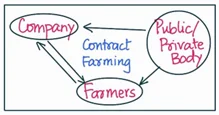Answer:
| Approach:
Introduction
- Give a brief about the status of land holding in India
Body
- Mention how small land holding makes farming unviable.
- Analyse whether contract farming and land leasing can act as a solution by giving both pros and cons.
Conclusion
- Conclude stating that a solution must be arrived at only after considering various factors in the region and including the viewpoints of all stakeholders.
|
Introduction:
The average size of land holding has been declining in India since Independence due to increase in population, diversion of agricultural land for industrialization and urbanization and also because of divisions within the family. The current size of land holding is 1.21 ha and 85% farmers are marginal farmers.
Body:
This has rendered agriculture unviable for vast majority as:
- Small farms are not suitable for using expensive technologies,
- Irrigation becomes difficult, and
- A lot of fertile agricultural land is wasted in providing boundaries.
Contract farming can be defined as agricultural production carried out according to an agreement between a buyer and farmers, which establishes conditions for the production and marketing of a farm product.

Advantages of Contract Farming:
- It will bring more technology and modernization to agriculture as seeds and inputs are given by business houses.
- Stabilize price for farmers as prices would be fixed in the contract.
- Assured market for their produce at their doorsteps, reducing marketing and transaction costs.
- Higher Yield and Productivity due to better input and investment as returns are guaranteed by agreement. This would increase the income for farmers
- Boost to the Food processing sector: For instance, the income of potato farmers in Punjab increased by 30-40% after they shifted to contract Farming by signing a contract with a Potato chips manufacturing company.
- For agri-processing industry, contract farming ensures consistent supply of agricultural produce with quality, at right time and lesser cost.
- Makes small scale farming competitive: Small farmers can access technology, credit, marketing channels and information while lowering transportation costs. Contract farming can also open up new markets which would otherwise be unavailable to small farmers.
Disadvantages of Contract Farming
- Excludes small farmers: Usually business deals are signed with farmers having more than 5 acres.
- Market risk: Companies decline to procure crops in case of less demand by raising quality issues.
- Production risk: Production cost is high in contract farming as quality inputs are used. But if crops fail, no company provides any insurance. There is also a risk of possible delays in payments and late delivery of inputs
- Bargaining power of individual small farmer is weak. Thus, the rate fixed can be exploitative.
- Loss of flexibility to sell to alternative buyers when prices increase
Conclusion:
Thus, even though contract Farming has significant potential to turnaround production in the Agriculture sector, it has a number of lacunae which needs to be rectified by corporatization of small farmers through cooperatives and FPOs. Accelerated technology transfer and capital inflow is expected to penetrate and an assured market for crop production will grow. It will safeguard the interest of small and marginal farmers, which in turn, could lead to a complete makeover of the agriculture industry in India.
